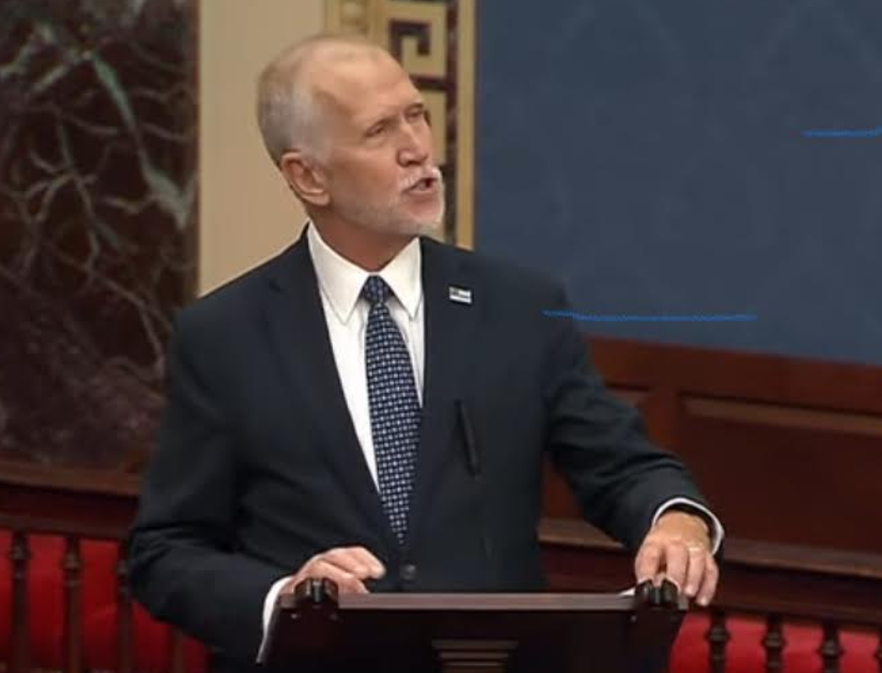
- Details
- By Chief Ben Barnes
Guest Opinion. As a tribal leader, I deeply understand the significance of sovereignty, culture, and history to Native nations. November, designated as Native American Heritage Month, is a time to honor these values and reflect on the resilience of federally recognized tribes that have tirelessly fought to protect their identities. It is also an opportunity to stand firm against efforts that threaten these principles through political maneuvering and financial incentives.
Recent actions by Senator Thom Tillis (R-N.C.), including blocking the Wounded Knee Massacre Memorial and Sacred Site Act, in order to promote legislative recognition for the Lumbee group directly threaten tribal sovereignty. Senator Tillis has accused the United Indian Nations of Oklahoma (UINO) of spreading misinformation about the Lumbee; however, no facts from the expert analysis have been challenged for accuracy. The issue lies not with those defending sovereignty but with Lumbee's claims, which lack even minimal historical and genealogical evidence.
In every tribal culture, respect for history and truth is paramount. We honor those who came before us and strive to protect their legacy. Unfortunately, the Lumbee group has demonstrated a lack of such respect. Their claims have shifted over time, and they now seek recognition without accountability or evidence.
The Lumbee refuse to pursue the process established by the Office of Federal Acknowledgment (OFA), which, while imperfect, is the only evidentiary-based method for federal recognition. They have no treaties, intertribal histories, removal records, military conflicts with the United States, or distinct language and culture. They are even unable to specify which historical tribe or tribes they descend from. These are not minor details; they are foundational elements that are completely absent.
In contrast, every one of the tribes unjustly maligned by Senator Tillis carries the scars of history. Whether they ceded millions of acres for westward expansion, endured removal, or survived genocidal campaigns in the West, each tribe has earned its stories and continues to live with the trauma and consequences of our darkest days. Our concerns regarding the Lumbee are born of our duty to protect the cultures we have paid such a high price to maintain.
Granting legislative recognition to the Lumbee would set a dangerous precedent. It would allow political interests to override the integrity of tribal sovereignty, potentially opening the floodgates for other groups with unverifiable claims to exploit federal resources and erode the hard-fought rights of federally recognized tribes.
The federal recognition of unsubstantiated groups would have significant financial implications for federally recognized tribes. In 2012, the Congressional Budget Office (CBO) estimated that the Lumbee Recognition Act would cost $846 million over five years. Adjusting for inflation and accounting for the addition of 6,000 new “members,” the cost of Lumbee recognition could soar to $1.75 billion from 2025 to 2030 alone. This figure is in addition to the hundreds of millions of federal dollars already being diverted to state-recognized groups like the Lumbee in the form of grants and contracts, with every penny coming at the expense of federally recognized tribes.
As tribal leaders, we understand that politicians do not grant sovereignty; it is inherent to our governments and has existed for thousands of years. Recognition is not a favor to be bestowed by lawmakers or a funding mechanism for those seeking financial gain. It solemnly acknowledges sovereignty rooted in history, culture, and truth. That is why the OFA process exists.
As caretakers of our respective nations’ histories and futures, tribal leaders must unite and urge Senator Tillis to respect the processes that protect all tribes and cease using intimidation and political maneuvering to shield the Lumbee from scrutiny. Tribal sovereignty is not a bargaining chip; recognition must be grounded in truth, not politics or financial incentives.
The identity and future of Indian Country depend on it.
Ben Barnes is Chief of the Shawnee Tribe and Chairman of the United Indian Nations of Oklahoma.
Help us defend tribal sovereignty.
At Native News Online, our mission is rooted in telling the stories that strengthen sovereignty and uplift Indigenous voices — not just at year’s end, but every single day.
Because of your generosity last year, we were able to keep our reporters on the ground in tribal communities, at national gatherings and in the halls of Congress — covering the issues that matter most to Indian Country: sovereignty, culture, education, health and economic opportunity.
That support sustained us through a tough year in 2025. Now, as we look to the year ahead, we need your help right now to ensure warrior journalism remains strong — reporting that defends tribal sovereignty, amplifies Native truth, and holds power accountable.
 The stakes couldn't be higher. Your support keeps Native voices heard, Native stories told and Native sovereignty defended.
The stakes couldn't be higher. Your support keeps Native voices heard, Native stories told and Native sovereignty defended.
Stand with Warrior Journalism today.
Levi Rickert (Potawatomi), Editor & Publisher

